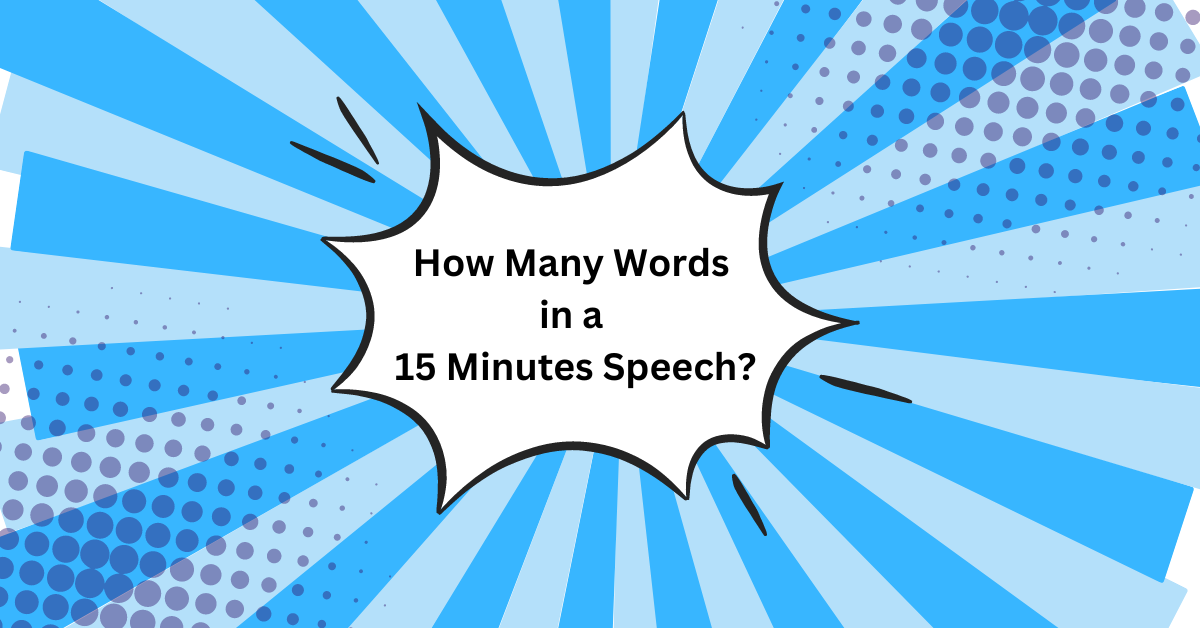Challenged by the daunting task of structuring a 15 minutes speech? Wondering how many words make a meaningful yet time-conscious speech?
You’re not alone, and you’ve found answers right here! This article will decrypt bite-sized elements, overlooked yet significant, that could make your speech-making journey less cumbersome.
The Mathematics of Speech
Numerous factors can influence the word count in a 15-minute speech, such as speaking speed, pauses, and audience engagement.
However, to let’s dwell mainly on the aspect of speaking speed, a factor that’s both crucial and manageable.
Average Speaking Rate
According to research, the average speaking rate for a conversational speech lies between 125 to 150 words per minute National Center for Voice and Speech. Let’s put this into perspective:
- Speech at 125 words per minute: 125 words/minute x 15 minutes = 1,875 words
- Speech at 150 words per minute: 150 words/minute x 15 minutes = 2,250 words
So, a 15-minute speech might entail anywhere from 1,875 to 2,250 words, depending on how fast or slow you talk.
“A 15-minute speech could range between 1,875 to 2,250 words, based on your speaking speed.”
Individual Variations
However, the above numbers are merely guidelines. Individual variations exist, e.g Some speakers might naturally speak faster, cramming in 180 words per minute.
In contrast, others might take their time, packing in just 100 words.
The Balancing Act: Words, Pace, and Audience Engagement
Speaking isn’t just about keeping to time or incorporating a specific number of words. It’s also about captivating your audience and making your speech memorable.
Pause in Pace
Before we dive into the power of pausing, let’s make sure our message packs a punch. Tools like the Word Counter can help us keep it concise and impactful.
Pauses are a crucial part of any speech. They allow your audience to absorb what you’ve said, keep them engaged, and provide you with some time to recover or think ahead.
Incorporating pauses means you’d need to reduce your number of words accordingly. Professional speeches often include a pause every minute.
So, factor in about a minute of total pause time for a 15-minute speech, which reduces the word count accordingly.
Measured Enthusiasm
People vary widely in their delivery. Some are passionate, fast-talkers, while others are calm, measured speakers.
Gauge your tendencies and try to find a balanced pace. After all, you’re not in a race against time, but engaged in a conversation with your audience.
Audience Interaction
Don’t forget the drew – asking questions, encouraging interaction, or simply making eye contact can break the monotony.
Such techniques might reduce your speech word count, but they enhance the overall experience significantly.
Ensuring Relevance: Quality Over Quantity
While it’s important to understand the maths of speech, the golden rule remains – quality trumps quantity. Pack your speech with relevance, not just words.
Crafting Content
Spend time crafting your content. Each of your 1875 to 2250 words should hold meaning, adding value for every listener in the audience.
Remember, a few well-chosen phrases can resonate far more than a soliloquy of empty words.
Make it Personal
Engaging anecdotes, personal stories or relevant examples can create a powerful impact. Relevance and connection trump word quantity for engaging listeners.
Closing with Impact
Endings matter! Conclude your speech effectively, even if it means straying a bit from the ‘word limit’.
An impactful conclusion can be the difference between a forgettable speech and a memorable one.
Conclusion
As you embark on the journey of creating a 15-minute speech, remember that the number of words can be a guiding light, but not a rigid rule.
It’s the content’s substance that ultimately matters. It’s more important to articulate your thoughts clearly and effectively, than to meet some arbitrary word count.
Use your words wisely, and with each word uttered, aim to engage, inform, and inspire!
“The most important thing in a speech is not the words you say, but the message you convey.”

